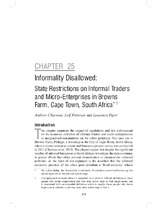| dc.contributor.author | Piper, Laurence | |
| dc.contributor.author | Charman, Andrew | |
| dc.contributor.author | Petersen, Leif | |
| dc.date.accessioned | 2021-02-04T12:09:12Z | |
| dc.date.available | 2021-02-04T12:09:12Z | |
| dc.date.issued | 2019 | |
| dc.identifier.citation | Piper, L. et al. (2019). Informality disallowed: State restrictions on informal traders and micro-enterprises in Browns farm, Cape Town, South Africa. Pan-African University Press: Austin | en_US |
| dc.identifier.isbn | 978-1943533404 | |
| dc.identifier.uri | http://hdl.handle.net/10566/5840 | |
| dc.description.abstract | This chapter examines the impact of regulations and law enforcement
on the economic activities of informal traders and micro-entrepreneurs
in marginalised communities on the urban periphery. Our case site is
Browns Farm, Philippi, a township in the City of Cape Town, South Africa,
where a micro-enterprise census and business operator survey was conducted
in 2011 (Charman et al, 2015). The chapter argues that despite the signi¿cant
number of informal businesses in South African townships, the state continues
to pursue efforts that either prevent formalisation or circumscribe informal
activities. At the heart of our argument is the assertion that the informal
economic practices of the urban poor constitute a ‘lived economy’ whose | en_US |
| dc.language.iso | en | en_US |
| dc.publisher | Pan-African University Press | en_US |
| dc.subject | Informal traders | en_US |
| dc.subject | State restrictions | en_US |
| dc.subject | Browns farm | en_US |
| dc.subject | Micro-enterprises | en_US |
| dc.subject | Economic activities | en_US |
| dc.title | Informality disallowed: State restrictions on informal traders and micro-enterprises in Browns farm, Cape Town, South Africa | en_US |
| dc.type | Book chapter | en_US |

